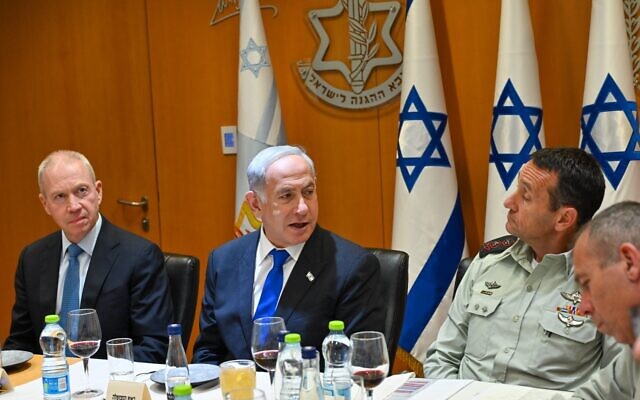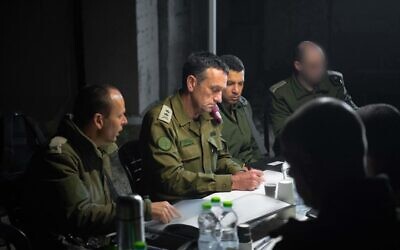Netanyahu government versus IDF: The unraveling army crisis explained
The conflict between Prime Minister Netanyahu's government and the IDF has been brewing for months, leading to several head-on clashes between ministers and the army.

The Israeli army is struggling with thousands of reservists no longer showing up for duty in protest of the judicial reforms, while at the same time the government launches near-daily verbal attacks on the IDF, deepening an unprecedented crisis.
The conflict between Prime Minister Netanyahu’s government and the IDF has brewed for months, leading to several head-on clashes between ministers and the army’s top brass.
Far-right lawmakers from Religious Zionism and Jewish Power accuse the IDF of being too soft on the Palestinians, failing to protect settlers, and being an extended arm of the “left-wing.”
But the biggest crisis is the one currently taking place, where the IDF is being attacked by Netanyahu and his coalition members for explaining the severity of the crisis in the army to the public.
On Friday, air force chief Tomer Bar warned that the harm to the force is “worsening” due to the mass refusal by reservist to show up for duty, and that the air force “won’t be the same as it was, even if everyone came back tomorrow.”
This led to a heated phone call in which Netanyahu, according to both Channel 12 and 13, shouted at Tomer Bar and IDF chief Herzl Halevi, saying: “It looks like the army is running the country. You’re damaging our deterrent credibility. Why are you putting out headlines like this?”
Halevi reportedly stood his ground, telling Netanyahu: “It is our duty to issue a warning when the army’s fitness is at risk.”

On Monday, Netanyahu’s son Yair, who is commonly believed to yield significant influence over his father and his decisions, shared a Facebook post, saying Halevi “will be remembered as the most failed and destructive chief of staff in the history of the IDF.”
Shortly after, Defense Minister Yoav Gallant issued a statement on Twitter, calling Halevi “one of the most excellent officers that I’ve met in all my years in the IDF and security establishment.”
Likud lawmaker Tali Gotliv, who has repeatedly attacked the IDF in recent months, accused Halevi on Tuesday for harming the IDF and playing into the hands of Israel’s enemies by talking publicly about the crisis in the army.
Regional Cooperation Minister David Amsalem echoed Gotliv on Tuesday, lashing out at Halevi and Tomer Bar: “In any normal army, you treat rebels like rebels should be treated. This is happening on their watch. This will enter the history books. People will learn in 20 and 30 years who the chief of staff was and who the Air Force chief was and what happened.”
Netanyahu has been harshly criticised in the media by Israeli security experts and opposition lawmakers for letting the IDF give a full briefing to the security cabinet about the damage to the army’s operational readiness.
‘Military coup’
In July, more than 10,000 soldiers in the army reserve announced they would no longer show up for duty due to the government’s judicial overhaul.
This led to unprecedented attacks by coalition members against the reserve soldiers, of whom 1,000 serve in the air force.
“A country that submits to the threats of generals will in fact be a country ruled by a military junta,” Finance Minister Betzalel Smotrich said.
National Security Minister Itamar Ben-Gvir (who never served in the IDF), said: “We will not give in to this dangerous attempt to create chaos, so that the army, which in a democratic country is subordinate to the government, will be the one that bends the government.”

The debate about the “refuseniks” (slang for those refusing army service) has also caused significant damage to cohesion in the IDF, for two reasons; the term “refusenik” is being used incorrectly, since the reserve soldiers announcing their termination of duty are volunteers, and therefore aren’t refusing service.
Secondly, the debate alienates the thousands of soldiers who have risked their lives to protect the state due to the fact that dozens of Netanyahu’s coalition members never served in the army as part of the status-quo arrangement that exempts ultra-orthodox from service.
According to a Channel 12 report, IDF chief Halevi asked Netanyahu to condemn the continuation of attacks by his government members against the military generals, a request the prime minister refused.
For each day that passes without a solution the issue of thousands of reservists refusing to show up for duty, the army, and in particular the air force, is being damaged.

Thank you for helping to make Jewish News the leading source of news and opinion for the UK Jewish community. Today we're asking for your invaluable help to continue putting our community first in everything we do.
For as little as £5 a month you can help sustain the vital work we do in celebrating and standing up for Jewish life in Britain.
Jewish News holds our community together and keeps us connected. Like a synagogue, it’s where people turn to feel part of something bigger. It also proudly shows the rest of Britain the vibrancy and rich culture of modern Jewish life.
You can make a quick and easy one-off or monthly contribution of £5, £10, £20 or any other sum you’re comfortable with.
100% of your donation will help us continue celebrating our community, in all its dynamic diversity...
Engaging
Being a community platform means so much more than producing a newspaper and website. One of our proudest roles is media partnering with our invaluable charities to amplify the outstanding work they do to help us all.
Celebrating
There’s no shortage of oys in the world but Jewish News takes every opportunity to celebrate the joys too, through projects like Night of Heroes, 40 Under 40 and other compelling countdowns that make the community kvell with pride.
Pioneering
In the first collaboration between media outlets from different faiths, Jewish News worked with British Muslim TV and Church Times to produce a list of young activists leading the way on interfaith understanding.
Campaigning
Royal Mail issued a stamp honouring Holocaust hero Sir Nicholas Winton after a Jewish News campaign attracted more than 100,000 backers. Jewish Newsalso produces special editions of the paper highlighting pressing issues including mental health and Holocaust remembrance.
Easy access
In an age when news is readily accessible, Jewish News provides high-quality content free online and offline, removing any financial barriers to connecting people.
Voice of our community to wider society
The Jewish News team regularly appears on TV, radio and on the pages of the national press to comment on stories about the Jewish community. Easy access to the paper on the streets of London also means Jewish News provides an invaluable window into the community for the country at large.
We hope you agree all this is worth preserving.





















